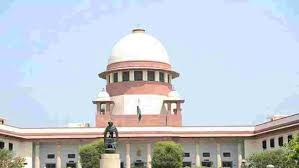CURRENT AFFAIRS
Get the most updated and recent current affair content on Padhaikaro.com
Contempt of court
- Vaid's ICS, Lucknow
- 03, Feb 2022

Why in News?
Chief Justice of India N.V. Ramana has agreed to immediately list for hearing a petition to initiate contempt action against Haryana authorities for not reining in ‘hooligans’ who have created an ‘atmosphere of communal hatred and terror’ for worshippers offering Friday prayers in Gurugram.
What’s the issue?
The petition condemned the inaction of the Haryana officials in violation of a Supreme Court judgment of 2018, which mandated that authorities should not be either silent spectators or tolerate communal violence and should use the law against hate crimes.
What is Contempt?
While the basic idea of a contempt law is to punish those who do not respect the orders of the courts, in the Indian context, contempt is also used to punish speech that lowers the dignity of the court and interferes with the administration of justice.
Contempt of court can be of two kinds:
- Civil, that is the willful disobedience of a court order or judgment or willful breach of an undertaking given to a court.
- Criminal, that is written or spoken words or any act that scandalises the court or lowers its authority or prejudices or interferes with the due course of a judicial proceeding or interferes/obstructs the administration of justice.
Relevant provisions:
- Article 129 and 215 of the Constitution of India empowers the Supreme Court and High Court respectively to punish people for their respective contempt.
- Section 10 of The Contempt of Courts Act of 1971 defines the power of the High Court to punish contempts of its subordinate courts.
- The Constitution also includes contempt of court as a reasonable restriction to the freedom of speech and expression under Article 19, along with elements like public order and defamation.
Facts for Prelims :
PM- DevINE:
PM-DevINE
- It will be implemented through the North-Eastern Council.
- North-Eastern Council (NEC) is the statutory body established after amending the North-Eastern Council Act, 1971 in the year 2002. It is the nodal agency for economic and social development of 8 North Eastern Region States.
- The Home Minister is the ex-officio chairperson of the Council. The DoNER Minister is the Vice-Chairman. The council has Governors and Chief Ministers of all eight northeastern states as its members.
- An initial allocation of Rs. 1,500 crore will be made for the new scheme.
- It will fund infrastructure, in the spirit of PM GatiShakti, and social development projects based on the felt needs of the North-East.
- This will enable livelihood activities for youth and women, filling the gaps in various sectors.
- However, it will not be a substitute for existing central or state Schemes.